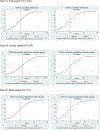Government of Malawi's unconditional cash transfer improves youth mental health
- PMID: 30826585
- PMCID: PMC6829911
- DOI: 10.1016/j.socscimed.2019.01.037
Government of Malawi's unconditional cash transfer improves youth mental health
Abstract
We explore the impacts of Malawi's national unconditional cash transfer program targeting ultra-poor households on youth mental health. Experimental findings show that the program significantly improved mental health outcomes. Among girls in particular, the program reduces indications of depression by about 15 percentage points. We investigate the contribution of different possible pathways to the overall program impact, including education, health, consumption, caregiver's stress levels and life satisfaction, perceived social support, and participation in hard and unpleasant work. The pathways explain from 46 to 65 percent of the program impact, advancing our understanding of how economic interventions can affect mental health of youth in resource-poor settings. The findings underline that unconditional cash grants, which are used on an increasingly large scale as part of national social protection systems in Sub-Saharan Africa, have the potential to improve youth mental wellbeing and thus may help break the vicious cycle of poverty and poor mental health.
Keywords: Cash transfers; Malawi; Mental health; Poverty; RCT; Youth.
Copyright © 2019 The Authors. Published by Elsevier Ltd.. All rights reserved.
Figures


References
-
- Alves FJO, Machado DB, Barreto ML, 2018. Effect of the Brazilian Cash Transfer Programme on Suicide Rates: a Longitudinal Analysis of the Brazilian Municipalities. Social Psychiatry and Psychiatric Epidemiology (in press). - PubMed
-
- Baird S, de Hoop J, Özler B, 2013. Income shocks and adolescent mental health. J. Hum. Resour 48 (2), 370–403.
-
- Cameron AC, Gelbach JB, Miller DL, 2008. Bootstrap-based improvements for inference with clustered errors. Rev. Econ. Stat 90 (3) 414–27.
-
- Carolina Population Center (CPC), 2014. Malawi social cash transfer Programme baseline evaluation report CPC: University of North Carolina at Chapel Hill (UNC). https://transfer.cpc.unc.edu/wp-content/uploads/2015/09/Malawi-SCTP-Base....
-
- Carolina Population Center (CPC), 2016a. Malawi social cash transfer Programme endline impact evaluation report CPC: University of North Carolina at Chapel Hill (UNC). https://transfer.cpc.unc.edu/wp-content/uploads/2015/09/Malawi-SCTP-Endl....
Publication types
MeSH terms
Grants and funding
LinkOut - more resources
Full Text Sources
Medical

